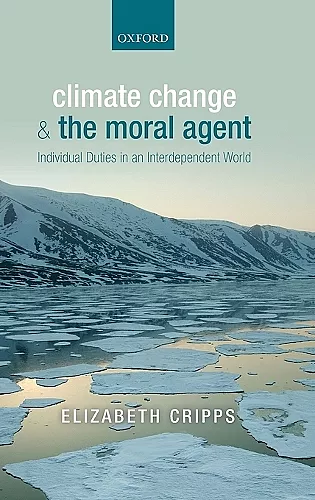Climate Change and the Moral Agent
Individual Duties in an Interdependent World
Format:Hardback
Publisher:Oxford University Press
Published:28th Mar '13
Currently unavailable, and unfortunately no date known when it will be back

Many of us take it for granted that we ought to cooperate to tackle climate change. But where does this requirement come from and what does it mean for us as individuals trying to do the right thing? Although climate change does untold harm to our fellow humans and to the non-human world, no one causes it on their own and it is not the result of intentionally collective action. In the face of the current failure of institutions to confront the problem, is there anything we can do as individuals that will leave us able to live with ourselves? This book responds to these challenges. It makes a moral case for collective action on climate change by appealing to moralized collective self-interest, collective ability to aid, and an expanded understanding of collective responsibility for harm. It also argues that collective action is something we owe to ourselves, as moral agents, because without it we are left facing marring choices. In the absence of collective action, individuals should focus on trying to promote such action (whether through or by bypassing existing institutions), with a supplementary duty to aid victims directly. The argument is not that we should not be cutting our own emissionsthis can be a vital part of bringing about collective action or alleviating harmbut that such `green lifestyle choices cannot straightforwardly be defended as duties in their own right, and should not take priority over trying to bring about collective change.
Elizabeth Crippss book is the first detailed study of climate change from both individual and collective responsibility viewpoints ... Crippss non-intentionalist model of collectivityhood is an interesting and timely contribution to the debate. We should discuss potential, should-be collectivities in addition to existing ones to get to grips with collective responsibility properly. The book not only advances climate ethics, but also bridges the gap between the former and social ontology, and I have no doubt that the arguments will find their way into mainstream discussions before long. * Säde Hormio, Journal of Social Ontology *
Overall, Cripps commendably reconciles the competing constructs of individual and collective agency, self-interest and altruism, and direct and indirect duties, and in the process develops an account of remedial responsibility that should be of interest to ethical theorists as well as those working in more applied "elds of normative analysis. * Steve Vanderheiden, University of Colorado at Boulder, Perspectives on Politics *
a fundamental text. * Carissa Beckwith, University of Utah, Environmental Values *
ISBN: 9780199665655
Dimensions: 240mm x 162mm x 21mm
Weight: 542g
272 pages